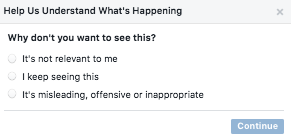Secure your place at the Digiday Media Buying Summit in Nashville, March 2-4
Facebook’s ‘I already owned this’ retargeting feature gains little traction
Retargeting ads are the new pop-ups that people love to complain about. That’s why Facebook’s 3-year-old ad feedback option “I already own this” would seem like a no-brainer. But the feature is not embraced by Facebook or media buyers.
Five ad buyers said they weren’t aware of the feature for Facebook ads until Digiday showed it to them. For their sake, the option isn’t available in the standard ad unit in News Feed. It’s not even available on mobile, where the majority — 92 percent in the third quarter of 2018 — of revenue is made. Rather, users can only access it for ads in the sidebar on the desktop version of Facebook.

But buyers were intrigued by the option, which would be another data input to identify customers or potential ones. While Facebook’s pixel can help with attribution from Facebook ads to online sales, that attribution is lost if users were to make a purchase in-store. Facebook’s News Feed ads only allow users to report an ad or hide an ad, where the reasons are lack of relevancy, frequency or inappropriateness.

Other retargeting ad providers, including Facebook’s duopoly friend Google, also don’t have the option. Google’s ads shown in-line with online content have a “hide” feature and will then ask users if they were: Not interested in this ad; Seen this ad multiple times; Ad was inappropriate; Ad covered content. Of course, retargeting to customers through platforms like Criteo and AdRoll isn’t necessarily wasted ad dollars.
Troy Osinoff, co-founder of digital agency Juice, said the option would be useful to ad buyers like himself. But that usefulness depends on if Facebook would actually share the data to the advertiser.
“The ‘I already bought this’ button is helpful as a marketer if Facebook passes along the information. This could be a helpful way to mark offline sales with no digital attribution. Even if Facebook does not pass this information on, it’s a great alternative to hiding an ad, since that has a negative impact,” Osinoff said.
For a workaround, people who see the ad of a product they already purchased could select “I keep seeing this.” But then the advertiser is left not knowing the reason.
“We created this feature because we want people to have a great experience with ads on Facebook. People who’ve already purchased a product can tell us that, so that we can show them a more relevant ad. We are always looking at ways we can make the experience better for people and advertisers on Facebook,” a Facebook spokesperson emailed.
Vadim Grinberg, vp of consumer growth and insight at retailer Dagne Dover, said his team tries to avoid showing ads to existing customers unless there are new products, gifting or promotions to show off. He added that he would appreciate more options to collect relevant and discrete feedback through Facebook.
“We often battle with not having enough information. However, we can gain valuable insight just by having relevance and interaction measurement in the ad platform, without getting individual feedback. In the end, we hope to have the right person get the right message and, even if they aren’t a customer yet, they are hopefully part of our community and able to give us the signals we need,” Grinberg said.
For now, his team at Dagne Dover focuses on the relevancy score when judging the quality of their Facebook advertising. The relevancy score, a number calculated by Facebook, relies on what actions Facebook users take. A positive interaction would be a video view while a negative one would be choosing to hide the ad, for example.
In theory, a positive interaction — for the buyer and for Facebook — would be knowing if a user had already bought a product.
More in Marketing

Thrive Market’s Amina Pasha believes brands that focus on trust will win in an AI-first world
Amina Pasha, CMO at Thrive Market, believes building trust can help brands differentiate themselves.

Despite flight to fame, celeb talent isn’t as sure a bet as CMOs think
Brands are leaning more heavily on celebrity talent in advertising. Marketers see guaranteed wins in working with big names, but there are hidden risks.

With AI backlash building, marketers reconsider their approach
With AI hype giving way to skepticism, advertisers are reassessing how the technology fits into their workflows and brand positioning.







